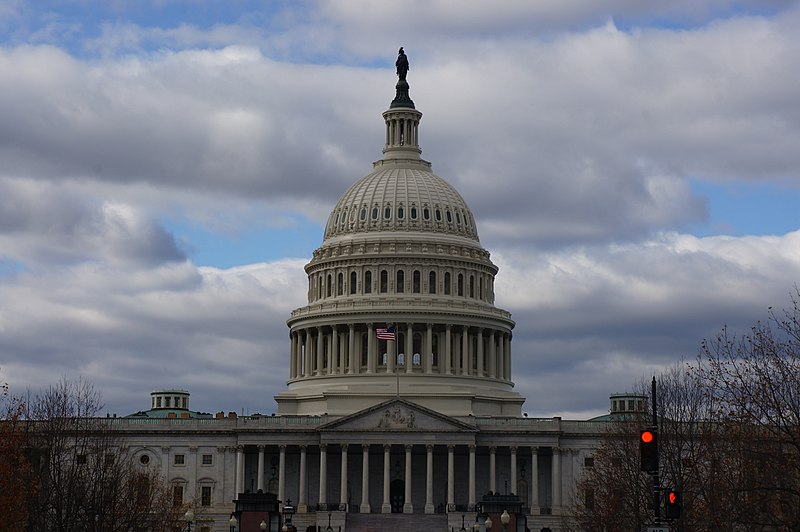
By: Jasmine Santos
Government contractors make up more than forty percent of the government workforce.[1] From security workers in the Smithsonian to programming specialists, government contractors play a huge role in facilitating the operations of the federal government.[2] Furthermore, the need for private sector skilled workers is necessary for the government to function properly, and without these government contractors, much of the government would be at a standstill.[3] In 2017, the government spent roughly $465 billion dollars on government contracts, including contracts for security workers at the Smithsonian and food service workers in federal buildings.[4] Although government contractors play a key role in the federal government during shutdowns federal contractors are not given the same benefits as government workers employed directly through the federal government.[5]
The most recent government shutdown in 2019, was the longest lasting thirty-five days, leaving many federal government contractors without a pay check.[6] After the shutdown federal government workers were entitled to back pay; however, government contractors were not.[7] Since 1976, there have been twenty-one government shutdowns, leaving government contractors without backpay and having to dig themselves out of a hole due to the government’s inability to pass a budget. [8] Although it has taken forty-three years, senators are finally pushing for legislation to provide backpay to low-wage government contractors.[9]
Under this proposed legislation, low-wage government contractors will be paid up to $965 per week in back pay during the time they were impacted by the government shutdown.[10] Many government contractors live paycheck-to-paycheck, making the unknowns of the government shutdown debilitating.[11] Though backpay will not eliminate all of these fears, it will allow workers to get back the money they deserve.[12] Since our government relies on these contractors, why are senators just now putting legislation on the table to give government contractors backpay?
One reason may be the significant impact this thirty-five day government shutdown had on private businesses and the economy.[13] Companies who provide government contractors to the government, felt the impact of not getting paid by the government and along with their employees as well as having their business at a standstill while the government figured out the budget .[14] This pressure on private sector businesses, which provide necessary services to the federal government, could be a reason why senators are finally seeing the need to provide back pay to government contractors.[15] The instability of a government shutdown on the backs of government contractors left many of them looking for work outside of the government contract sphere.[16] The possibility of government contractors leaving their positions for more stable ones could lead the businesses who employee government contractors profits to fail or lead to an inability to supply the needs of their contracts with the federal government.[17]
No matter what reason pushed senators to finally put legislation on the table to give backpay to government contractors, this is a huge step in the right direction to protect low-wage workers from instability of the federal government. It will be interesting to see if this bill will be adopted by more senators and if there will be allocation in the budget to provide a buffer to alleviate some of the pressure this shutdown has had on federal government contractors around the Country.
[1] Niel Gordon, Cont. and the True Size of Gov’t, Project On Gov’t Oversight (Oct. 5, 2017), https://www.pogo.org/analysis/2017/10/contractors-and-true-size-of-government/.
[2] Sean Higgins, Fed. contractors are hardest hit by shutdown because they won’t get backpay, Washington Examiner (Jan.19, 2019), https://www.washingtonexaminer.com/policy/economy/federal-contractors-are-hardest-hit-by-shutdown-because-they-wont-get-back-pay.
[3] Id.
[4] See Michael Corkey, Gov’t Shutdown Squeezes Contractors as Checks Stop and Invoices Stall, N.Y. Times (Jan. 12, 2019), https://www.nytimes.com/2019/01/12/business/contractors-government-shutdown-effect.html; see also Higgens, supra note 2.
[5] See Higgens, supra note 2 (stating that government contractors are not entitled to backpay like those who are directly employed by the federal government).
[6] Gretchen Frazee and Lisa Desjardins, How the Gov’t Shutdown Compared to Every Other Since 1976, PBS News Hour (last updated Jan. 25, 2019), https://www.pbs.org/newshour/politics/every-government-shutdown-from-1976-to-now.
[7] Higgens, supra note 2.
[8] Jennifer Earl, A Look Back at Every Gov’t Shutdown in US history, Fox News (last updated Jan. 28, 2019), https://www.foxnews.com/politics/a-look-back-at-every-government-shutdown-in-us-history.
[9] Id.
[10] Fair Compensation for Low-wage Cont. Emp. Act, (proposed Jan. 16, 2019), https://www.tomudall.senate.gov/imo/media/doc/Fair%20Compensation%20for%20Low-Wage%20Contractor%20Employees%20Act.pdf.
[11] Higgens, supra note 2 (describing the impact of the shutdown on government contractors who live paycheck to paycheck and are not able to get back pay or file or unemployment).
[12] Id.
[13] See Kimberly Kindly, Lisa Rein & Joel Achenbach, Consequences of the Gov’t Shutdown Strike the Priv. Sector, Washington Post (Jan. 3, 2019) https://www.washingtonpost.com/national/consequences-of-the-government-shutdown-strike-the-private-sector/2019/01/03/dcc66f98-0f73-11e9-831f-3aa2c2be4cbd_story.html?utm_term=.36198380d468.
[14] Id.
[15] Id.
[16] Id.
[17] Id.

